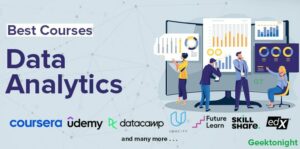Data streaming is a vital technology in the modern data landscape. It enables organizations to harness the power of real-time data to make informed decisions, react swiftly to changing conditions, and gain a competitive edge in today’s fast-paced digital world.
Departing from the traditional batch processing methods, this approach allows for the seamless flow of data from sources like sensors, applications, and social media feeds, enabling instant analysis and decision-making. All this also makes Data streaming Courses a valuable credential in today’s data-driven world. As organizations increasingly rely on real-time data for decision-making, having professionals who are certified in data streaming can be a significant advantage.
Why is Data Streaming Important?
In a recent survey by Forbes, it was found that over 59% of businesses consider real-time data crucial for their operations. This statistic reflects the growing recognition of data streaming’s significance. For instance, in the financial sector, where every millisecond matters, high-frequency trading firms leverage data streaming to make split-second investment decisions. Furthermore, in e-commerce, a 15% increase in sales was observed by implementing real-time personalized product recommendations. These statistics underscore how data streaming empowers organizations to respond swiftly to market changes, enhance customer experiences, and gain a competitive edge by leveraging the power of real-time data analytics.
By taking the time to learn data streaming, you can acquire a valuable skill set that is highly sought after in today’s data-driven job market. If you’re interested in obtaining a data streaming certification, then learning for the Best Data Streaming Courses is the way to go.
Table of Content
- 1 Best Data Streaming Courses, Certification, Tutorials, Training, Classes Online
- 1.1 Data Streaming Nanodegree Program [Udacity]
- 1.2 Streaming Big Data with Spark Streaming and Scala [Udemy]
- 1.3 Big Data Integration and Processing [Coursera]
- 1.4 Apache Kafka Series – Kafka Streams for Data Processing [Udemy]
- 1.5 Streaming Concepts [Datacamp]
- 1.6 Apache Spark Streaming with Python and PySpark [Udemy]
- 2 FAQ
Our product recommendations are unbiased and based on an independent review process. We may receive a commission for links to recommended partners. See our advertiser disclosure for more information.
Best Data Streaming Courses, Certification, Tutorials, Training, Classes Online
Data Streaming Nanodegree Program [Udacity]
The Udacity Data Streaming Nanodegree Program is a comprehensive journey designed to equip you with the latest skills in real-time data processing and learn data streaming. Throughout this program, you will delve into the world of modern data engineering tools, including Apache Kafka, Spark Streaming, Kafka Streaming, and more.
Course Instructor
The program’s authors, including Sean Murdock, a Professor at Brigham Young University Idaho, and industry experts like Judit Lantos, Senior Data Engineer at Netflix, bring a wealth of knowledge and experience to ensure a comprehensive and practical learning experience.
Pros & Cons
Pros
- Flexible Learning
- Career-Focused
- Continuous Learning
Cons
- Time Commitment
- Prerequisites
Key Highlights & Learning Objectives
- The program focuses on building expertise in processing real-time data, making it highly relevant in today’s data-driven industries.
- Students gain proficiency in modern data engineering tools such as Apache Kafka and Spark Streaming, preparing them for the latest industry demands.
- Through practical projects like streaming public transit status and evaluating human balance, learners apply their knowledge in real-world scenarios.
- With a focus on tools and technologies currently in demand, graduates are well-prepared to meet the needs of data-driven organizations.
Who is it for?
This Data Streaming certification is intended for data professionals, software engineers, and individuals passionate about data, offering them the opportunity to acquire in-demand skills in real-time data processing. It’s particularly well-suited for those already familiar with basic statistics, intermediate Python, SQL, and ETL, and are seeking to advance their careers in data engineering or related fields.
Rating: 4.6/5
Duration: 2 months
Streaming Big Data with Spark Streaming and Scala [Udemy]
This comprehensive data streaming course online provides a deep dive into the exciting world of real-time big data processing. Taught by Frank Kane, a former Amazon and IMDb engineer, the course covers everything from setting up your environment to processing massive streams of real-time data, integrating with sources like Kafka, and using Spark’s Structured Streaming API.
Course Instructor
Frank Kane, the author of this certification course, is an experienced data expert with Amazon and IMDb background, holding 17 patents in distributed computing and machine learning. Frank’s engaging teaching style reflects his commitment to empowering students in data analysis.
Pros & Cons
Pros
- Real-World Relevance
Cons
- Some course activities may be outdated
Key Highlights & Learning Objectives
- This course delves into the exciting realm of real-time big data processing, equipping you with the skills to handle continuous data streams effectively.
- From setting up your development environment to integrating with data sources like Kafka and using Spark’s Structured Streaming API, this course comprehensively covers key aspects of Spark Streaming and Scala.
- Learn how to apply machine learning to streaming data and use it for real-time predictions.
- This course includes 6.5 hours of on-demand video, 3 articles, and a certificate of completion.
Who is it for?
This data streaming certification course is designed for a diverse audience, including data engineers, data scientists, software developers, and professionals in data-driven industries who are seeking to enhance their expertise in real-time big data processing and harness the power of Spark Streaming and Scala.
Rating: 4.6/5
Students Enrolled: 55,724
Duration: 7 hours
Big Data Integration and Processing [Coursera]
The Big Data Integration and Processing course, part of the Big Data Specialization, is a tailored data streaming course for beginners with no previous data science experience. This self-paced, introduces essential concepts in big data integration and processing.
Course Instructor
This course is led by two experienced instructors: Ilkay Altintas and Amarnath Gupta, both affiliated with the University of California San Diego.
Pros & Cons
Pros
- No Prior Programming Required
Cons
- No Mention of Discussion Forums
Key Highlights & Learning Objectives
- Designed for beginners with no prior data science experience, making it accessible to a wide range of learners.
- Offers a self-paced learning experience, allowing you to study at your own convenience.
- Suitable for individuals with no prior programming experience.
- Clearly defined hardware and software requirements to ensure smooth course participation.
- The course comprises 7 modules with 42 videos, 21 readings, 4 quizzes, and 10 assessments, and a certificate of completion.
Who is it for?
This data streaming certification course is tailored for beginners who are eager to venture into the realm of data science. It serves as an excellent entry point for individuals with no prior data science experience but aspire to understand and work with big data.
Rating: 4.4/5
Students Enrolled: 112,690
Duration: 17 hours
Apache Kafka Series – Kafka Streams for Data Processing [Udemy]
Explore the world of real-time data processing with the Udemy Kafka Streams for Data Processing course. Dive deep into Kafka Streams, the powerful data processing library for Apache Kafka, and harness its capabilities to transform, scale, and deploy your applications seamlessly.
Course Instructor
The course is led by Stephane Maarek, a renowned AWS Certified Solutions Architect, and Conduktor Kafkademy, and Conduktor Kafkademy, founded by Stéphane Maarek himself, offers an enterprise platform to enhance Kafka usage.
Pros & Cons
Pros
- Instructor Support
- Additional Resources
Cons
- Technical Prerequisites
Key Highlights & Learning Objectives
- Master Apache Kafka Streams through a comprehensive curriculum covering topics such as Exactly Once Semantics, scaling applications, and hands-on exercises.
- Gain practical experience by writing Kafka Streams applications in Java 8, allowing you to apply your knowledge in real-world scenarios.
- Access a unique blend of expertise with the collaboration of Conduktor Kafkademy, an enterprise platform designed to enhance Kafka usage.
- This course includes 5 hours of on-demand video content, 5 articles, 1 downloadable resource, and a certificate of completion.
Who is it for?
This data streaming online course is tailored for developers, DevOps professionals, architects, and data engineers seeking to master Apache Kafka Streams for real-time data processing. It assumes a foundational understanding of Apache Kafka and is best suited for Java 8 and Scala developers who want to learn how to write, deploy, and scale Kafka Streams applications.
Rating: 4.5/5
Students Enrolled: 78,727
Duration: 5 hours
Streaming Concepts [Datacamp]
This comprehensive course on Streaming Concepts offers a deep dive into the world of real-time data processing. It covers essential topics such as the distinction between batching and streaming, strategies for scaling streaming systems, and practical applications across various industries, helping you better understand and learn data streaming.
Course Instructor
The course is taught by Mike Metzger, a seasoned Data Engineer Consultant with over 20 years of experience. He specializes in SQL, Python, and Apache Spark, and has a strong background in data making him a highly qualified and credible resource to impart knowledge on data streaming concepts and real-time data processing in this course.
Pros & Cons
Pros
- Real-World Examples
Cons
- Course Length
Key Highlights & Learning Objectives
- The course provides a thorough understanding of streaming concepts, including the distinction between batching and streaming, scalability strategies, and practical real-world applications.
- It explores how streaming technology is used across diverse industries, making it relevant and valuable for professionals in various sectors.
- Throughout the course, real-world examples and case studies are used to illustrate the practical application of streaming concepts, enhancing the learning experience.
- The course offers 16 videos with over 2 hours of content, 47 exercises and a certificate of completion.
Who is it for?
This Udemy Streaming Concepts course caters to a diverse audience, including data professionals, software developers, data enthusiasts, managers, students, entrepreneurs or anyone looking to enhance your data skills, understand the impact of real-time data processing on decision-making, or explore new career opportunities in the data field.
Rating: 4.7/5
Duration: 2 hours
Apache Spark Streaming with Python and PySpark [Udemy]
This data streaming certification course dives into the world of Apache Spark Streaming, offering a deep understanding of how to harness the power of PySpark, the Python API for Spark, to create dynamic big data streaming pipelines.
Course Instructor
The course is crafted by industry experts, including James Lee, Tao W., and Matthew P. McAteer, who collectively bring extensive experience in big data analytics and software engineering. Their combined expertise ensures that this course offers valuable insights into data streaming
Pros & Cons
Pros
- Real-World Applications
Cons
- Prerequisite Knowledge
Key Highlights & Learning Objectives
- Gain in-depth knowledge of Apache Spark Streaming and its practical applications for real-time data processing.
- Learn to analyze live data streams, including Twitter feeds, to extract valuable insights.
- Access the same big data technology utilized by Fortune 500 companies, empowering you to apply it in your own projects or career.
- Stay up-to-date with the most recent version of Spark (2.3) and explore its advanced features for data manipulation.
- Master advanced techniques for optimizing and tuning Spark jobs, including partitioning, caching, and persisting RDDs.
- Access on-demand video, 6 articles, 35 downloadable resources, and offers a certificate of completion.
Who is it for?
This online data streaming course is designed for Python developers, data engineers, data science enthusiasts, and experienced professionals in data engineering teams who are eager to delve into the world of Apache Spark Streaming with Python and PySpark.
Rating: 4.1/5
Students Enrolled: 53,833
Duration: 4 hours
FAQ
What is the difference between streaming data and normal data?
Streaming data and normal data differ in their handling and processing methods:
– Streaming Data: Streaming data refers to continuous and real-time data that is generated and processed continuously. It is often used for real-time analytics, monitoring, and immediate responses.
– Normal Data: Normal data, also known as batch data, is static and collected over a period of time before processing. It is typically stored and processed in batches, making it suitable for historical analysis.
What is data streaming in Kafka?
Data streaming in Kafka refers to the process of real-time data ingestion and distribution using the Apache Kafka platform. Kafka allows for the efficient and scalable handling of streaming data by using publish-subscribe messaging. It enables multiple data producers to send data to one or more consumers in real time.
What is streaming data in telecom?
Streaming data in telecom refers to the continuous flow of data in real-time networks. Telecom companies use streaming data for various purposes, such as monitoring network performance, analyzing call data records, and detecting anomalies in network traffic.
What is IoT data streaming?
IoT data streaming involves the continuous transmission and processing of data generated by Internet of Things (IoT) devices. IoT devices send sensor data, telemetry, and other information in real time to centralized systems for analysis, decision-making, and control.












